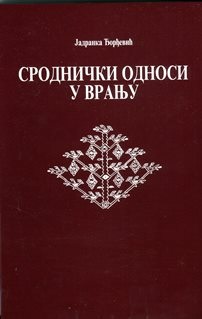Сроднички односи у Врању
The Kinship in the Region of Vranje
Author(s): Jadranka Đorđević-Crnobrnja
Subject(s): Anthropology, Social Sciences, Customs / Folklore, Sociology, Family and social welfare
Published by: Етнографски институт САНУ
Summary/Abstract: Main task of this work has been to examine kin relationships – in their range, content and function – of Vranje family with its extra-family relatives.
The Vranje family forms kinship network wich is narrow in its range. Family maintains intimate relations with a small number of relatives, mainly with the nearest kin. Relatives up to the fourth cousins in lateral range, or in vertical range of lineage, are recognized as closer kin and with them the elementary family creates more intensive interaction and stronger connectedness than with genealogically more distant kin. Family interaction with the genealogically more distant kin is reduced to occasional gatherings.
Geographic distance between a family and its relatives is an obstacle to intensive contacts and a limiting factor in forming higher degree of kinship connectedness. Low living standard also contributes that contacts among relatives are less intensive.
Range, content and function of kin relationships depend upon: family structure, its internal organisation (performance of conjugal roles), situational factors, influence of psychological mechanisms and recognition of certain cultural patterns. The contacts of the Vranje families with their kin are shaped up, to a considerable extent, by traditional patterns of behaviour. Cultural patterns and kinship terminology are the part of kinship system wich change the most slowly. Changes that occur within the kinship system are for the most part structural in their nature, while content of the system is less prone to changes. In solving many of its problems, family relies on kin’s help. Relationships with kin in not limited in their role and importance only to kinship solidarity, but are included in socialization process of an individual. The kin relationships represent important part of social relationships in the modern world and they help in forming of structuralized social reality.
- Print-ISBN-10: 86-7587-018-3
- Page Count: 139
- Publication Year: 2001
- Language: Serbian
- eBook-PDF
- Sample-PDF
- Table of Content
- Introduction

